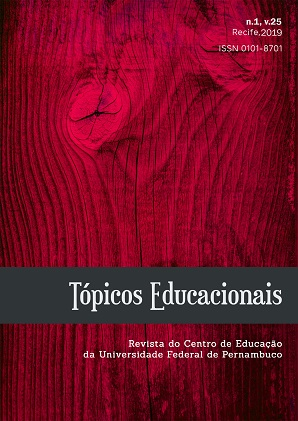Acessibility in virtual learning environment: case study with blind teachers
DOI:
https://doi.org/10.51359/2448-0215.2019.243785Keywords:
Distance education, Virtual Learning Environments, Acessibility, Blind studentsAbstract
lthough the crescent number of visual impaired students in higher education,difficulties to access Virtual Learning Environments (VLE) have prevented the full participation of blind people in distance courses. VLE can be accessed by the blind through webvox or screen readers such as JAWS, NVDA and ORCA, but many contents and tools of these environments are not accessible for these users yet. This research seeks to identify difficulties faced by two blind teachers in a post graduation course on Specialized Educational Service(AEE)in which it is used the VLE Teleduc. Through a case studywith the teachers, it was identified that they have had difficulty accessing, by Jaws, tools: dynamics of the course, activities, support materials, readings, polls, and portfolio. In the search for solutions, the importance of adopting accessibility strategies as recommended by the studies is reinforced.
References
ABED. Censo EAD.BR: relatório analítico da aprendizagem a distância no Brasil 2018. Associação Brasileira de Educação a Distância. Curitiba: InterSaberes, 2019. Disponível em http://abed.org.br/arquivos/CENSO_DIGITAL_EAD_2018_PORTUGUES.pdf Acesso em 04/11/2019.
BRASIL. Decreto Presidencial no 5.296, de 2 de dezembro de 2004. Disponível em http://www.planalto.gov.br/ccivil/_ato2004-2006/2004/decret/d5296.htm Acesso em 21/07/2010.
CAMPOS, Mariana de Lima Isaac Leandro; MENDES, Enicéia Gonçalves. Formação de professores para a educação inclusiva em cursos a distância: um estudo de campo documental. Revista Cocar. Belém/Pará. Edição Especial, N. 1, p. 209-227, 2015. Disponível em: https://paginas.uepa.br/seer/index.php/cocar/article/viewFile/625/513 Acesso em 10/09/2019.
CARVALHO, Lucas Pedroso et al. Análise de acessibilidade no ambiente virtual de aprendizagem Moodle: um estudo de caso do uso do MIS com leitores de tela. Em SÁNCHEZ, J. (Ed.) Nuevas ideas em Informática Educativa, v. 14, p. 174-185, 2018, Santiago do Chile. Disponível em http://www.tise.cl/Volumen14/TISE2018/174.pdf Acesso em 22/10/2019.
COELHO, Cristina Madeira et al. Acessibilidade para pessoas com deficiência visual no Moodle. Linhas Críticas, Brasília, DF, v. 17, n. 33, p. 327-348, 2011. Disponível em https://core.ac.uk/download/pdf/33546553.pdf Acesso em 22/10/2019.
GABARDO, Patrícia; QUEVEDO, Sílvia R. P. de; ULBRICHT, Vânia Ribas. Estudo comparativo das plataformas de ensino-aprendizagem. Revista Eletrônica de Biblioteconomia. Ci. Inf., Florianópolis, n. esp., 2o sem 2010, p. 65-84. Disponível em: https://periodicos.ufsc.br/index.php/eb/article/view/1518-2924.2010v15nesp2p65/15763 Acesso em 10/09/2019.
GODINHO, Francisco. Internet para Necessidades Especiais. Edição: UTAD / GUIA, 1999. Disponível em: http://www.acessibilidade.net/web/ine/livro.html Acesso em: 28/03/2010.
KENSKI, Vani Moreira. Educação e tecnologia: o novo ritmo da informação. Campinas, SP: Papirus, 2007.
LIRA, Ana Karina Morais de; LIRA, Carlos André Morais de; "Acessibilidade em calçadas da Universidade Federal de Pernambuco", p. 246-259. In: Anais do 15º Ergodesign & Usihc [=Blucher Design Proceedings, vol. 2, num. 1]. São Paulo: Blucher, 2015. ISSN 2318-6968,
DOI 10.5151/15ergodesign-47-E119. Disponível em: http://www.proceedings.blucher.com.br/article-details/acessibilidade-em-caladas-
da-universidade-federal-de-pernambuco-18989 Acesso em: 18/09/2019.
MOODLE – Disponível em https://docs.moodle.org/38/en/About_Moodle Acesso em 10/09/2019.
OCHAITA, Esperanza; ESPINOSA, Maria Ángeles (2004) Desenvolvimento e intervenção educativa nas crianças cegas ou deficientes visuais. In: COLL, César; MARCHESI, Álvaro e PALACIOS, Jesus. Desenvolvimento psicológico e educação: transtornos de desenvolvimento e necessidades educativas especiais, 2ª edição. Porto Alegre: Artmed, 2004. (p. 151 a 170).
SÁ, Elizabet Dias de. Cegueira e baixa visão. In SILUK, Ana Cláudia Pavão (Org). Atendimento Educacional Especializado: contribuições para a prática pedagógica. Santa Maria: Universidade Federal de Santa Maria, 1a reimpressão, 2014, p. 204-234. Disponível em https://www.ufsm.br/orgaos-executivos/caed/wp-content/uploads/sites/391/2019/04/Atendimento-Educacional-Especializado-Contribuições-para-a-Prática-Pedagógica.pdf Acesso em 16/10/2019.
SONZA, Andréa Poleto (2008) Ambientes virtuais acessíveis sob a perspectiva de usuários com limitação Visual. Programa de Pós-Graduação em Informática na Educação da Universidade Federal do Rio Grande do Sul. Tese de doutorado. Disponível em https://www.lume.ufrgs.br/bitstream/handle/10183/14661/000666392.pdf Acesso em 27/07/2010.
SZESZ JUNIOR et al. Acessibilidade em Ambiente Virtual de Aprendizagem. Revista Brasileira de Ensino de Ciência e Tecnologia, Ponta Grossa, v. 9, n. 1, p. 1-24, 2016. Disponível em https://periodicos.utfpr.edu.br › rbect › article › download › pdf Acesso em 22/10/2019.
TELEDUC – Disponível em www.teleduc.org Acesso em 27/07/2010.
WAI - Web Accessibility Initiative. How people with disabilities use the web. Disponível em https://www.w3.org/WAI/EO/Drafts/PWD-Use-Web/#blindness Acesso em 24/07/2010.
W3C - World Wide Web Consortium. Disponível em:http://www.w3c.br Acesso em: 28/03/2010.
YIN, Robert K. Estudo de caso: planejamento e métodos. 3ª Ed. – Porto Alegre: Bookman, 2005.
Published
Issue
Section
License
Copyright (c) 2019 Tópicos Educacionais

This work is licensed under a Creative Commons Attribution 4.0 International License.
Authors who publish in this journal agree to the following terms:
a) Authors retain copyright and grant the journal the right of first publication, with the work simultaneously licensed under the Creative Commons license: org/licenses/by/4.0, which allows sharing the work with acknowledgment of its authorship and initial publication in this journal.
b) This journal provides public access to all its content, as this allows for greater visibility and reach of the articles and reviews published. For more information about this approach, visit the Public Knowledge Project, a project that developed this system to improve the academic and public quality of research, distributing the OJS as well as other software that supports public access to academic sources. Names and email addresses provided on this site will be used exclusively for the purposes of the journal and will not be made available for other uses.









